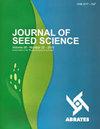Scarification and doses of Acadian®, Stimulate® and Trichoderma spp. promote dormancy overcoming in Hymenaea courbaril L. seeds?
IF 1.2
4区 农林科学
Q3 AGRONOMY
引用次数: 1
Abstract
Abstract: The present study establishes the following research problem: Can different concentrations of Acadian®, Stimulate®, and Trichoderma spp. be effective in promoting the emergence and vigor of Hymenaea courbaril seedlings with or without mechanical scarification? The experimental design used was completely randomized, in a 4 x 3 x 2 factorial scheme, corresponding to four concentrations (0, 5.0, 10.0, and 15.0 mL.L-1), three hormones (Acadian®, Stimulate® and Trichoderma spp.), with and without mechanical scarification, with four replicates, each of which consisting of 25 seeds. Acadian® at a concentration of 5.0 mL.L-1 in scarified seeds of H. courbaril leads to a greater increase in the percentage of emergence and percentage of normal seedlings. Stimulate® at concentrations of 10.0 and 15.0 mL.L-1 is efficient in obtaining more than 85% emergence seedlings with seeds subjected to mechanical scarification. Trichoderma spp. from 9.0 mL.L-1 does not favor gains in the percentage of normal seedlings of Hymenaea courbaril grown from seeds with and without mechanical scarification. The dose of maximum technical efficiency (DMTE) of the bioregulator Acadian® is 8.50 mL.L-1 and, in scarified seeds of H. courbaril, it increases the percentage of seedling emergence.Acadian®、stimulation®和木霉的切割和剂量促进了膜aea coubbayl .种子的休眠。
摘要:本研究建立了以下研究问题:不同浓度的Acadian®、stimulation®和Trichoderma spp.是否能有效促进机械切割或不机械切割的膜aea coubaril幼苗的出苗和活力?试验采用完全随机设计,采用4 × 3 × 2因子方案,对应4种浓度(0、5.0、10.0和15.0 mL.L-1), 3种激素(Acadian®、刺激剂®和木霉),有和没有机械划伤,4个重复,每个重复包含25个种子。Acadian®浓度为5.0 mL.L-1的Acadian®在H. courbaril固化种子中,出苗率和正常幼苗率均有较大的提高。刺激®在10.0和15.0 mL.L-1的浓度下,可以有效地获得85%以上的出苗,种子经过机械切割。9.0 mL.L-1浓度的木霉均不利于木耳经机械切割后正常幼苗的生长。生物调节剂Acadian®的最大技术效率(DMTE)剂量为8.50 mL.L-1,在木黄种子中可提高出苗率。
本文章由计算机程序翻译,如有差异,请以英文原文为准。
求助全文
约1分钟内获得全文
求助全文
来源期刊

Journal of Seed Science
Agricultural and Biological Sciences-Agronomy and Crop Science
CiteScore
2.00
自引率
30.00%
发文量
28
审稿时长
12 weeks
期刊介绍:
From 2017 the Journal of Seed Science (JSS) will circulate online version only.
Original scientific studies and communications, not yet published or submitted to another journal for publication and written in Portuguese or English, will be accepted for publication. For manuscripts submitted in English, the authors should provide an adequated version.
The SCIENTIFIC COMMUNICATION is a category of scientific manuscript which describes a technique, an equipment, new species or observations and surveys of limited results. It has the same scientific rigor as the “Scientific Articles” and the same value as a publication. The classification of a manuscript as a SCIENTIFIC COMMUNICATION is based on its content and scientific merit but it can be a preliminary study, simple and not definitive on a certain subject, with publication justified by its uniqueness and contribution to the area.
The Editorial Board of the JSS may invite leading authors of recognized reputation to compose specific Review Articles covering topics of their specialization that will convey to the scientific community the state-of-the-art knowledge related to the specific theme.
 求助内容:
求助内容: 应助结果提醒方式:
应助结果提醒方式:


